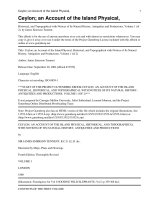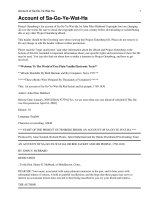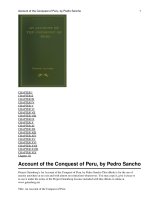fordham university press giving an account of oneself nov 2005
Bạn đang xem bản rút gọn của tài liệu. Xem và tải ngay bản đầy đủ của tài liệu tại đây (1.36 MB, 160 trang )
Giving an Account of Oneself
PAGE i
11486$ $$FM 07-27-05 13:54:41 PS
PAGE ii
11486$ $$FM 07-27-05 13:54:41 PS
judith butler
Giving an Account of Oneself
Fordham University Press
New York, 2005
PAGE iii
11486$ $$FM 07-27-05 13:54:41 PS
Copyright ᭧ 2005 Fordham University Press
All rights reserved. No part of this publication may be reproduced, stored in
a retrieval system, or transmitted in any form or by any means—electronic,
mechanical, photocopy, recording, or any other—except for brief quotations
in printed reviews, without the prior permission of the publisher.
Library of Congress Cataloging-in-Publication Data
Butler, Judith.
Giving an account of oneself / Judith Butler.—1st ed.
p. cm.
Includes bibliographical references and index.
ISBN 0-8232-2503-8 (hardcover) — ISBN 0-8232-2504-6 (pbk.)
1. Self (Philosophy) 2. Ethics. 3. Conduct of life. I. Title.
BD450.B895 2005
170Ј.42—dc22 2005017141
Printed in the United States of America
07 06 05 5 4 3 2 1
First edition
PAGE iv
11486$ $$FM 07-27-05 13:54:41 PS
contents
Acknowledgments vii
Abbreviations ix
1. An Account of Oneself 3
Scenes of Address 9 Foucaultian Subjects 22 Post-Hegelian
Queries 26 ‘‘Who Are You?’’ 30
2. Against Ethical Violence 41
Limits of Judgment 44 Psychoanalysis 50 The ‘‘I’’ and the ‘‘You’’ 65
3. Responsibility 83
Laplanche and Levinas: The Primacy of the Other 84 Adorno on
Becoming Human 101 Foucault’s Critical Account of Himself 111
Notes 137
Index 147
PAGE v
v
11486$ CNTS 07-27-05 13:55:19 PS
PAGE vi
11486$ CNTS 07-27-05 13:55:20 PS
acknowledgments
The chapters of this book were originally given as the Spinoza Lec-
tures for the Department of Philosophy at the University of Amster-
dam in the spring of 2002. I am grateful to Hent de Vries for
extending that generous invitation and for the opportunity to work
through some of this material with the students in Amsterdam. This
work began as the topic of a faculty seminar at Princeton University
in the fall of 2001, when I was a fellow at the Humanities Council. I
gained an enormous amount from my discussions with faculty and
students there. Finally, the material was delivered in revised form as
the Adorno Lectures for the Institut fu
¨
r Sozialforschung in Frank-
furt in the fall of 2002. I thank Axel Honneth for the opportunity
to revisit and engage Adorno’s work in a new way. I am equally
grateful for discussions there with numerous individuals who offered
me an intense engagement with the questions I raise. This text ap-
peared in an earlier and substantially abbreviated form in the Nether-
lands as Giving an Account of Oneself: A Critique of Ethical Violence with
Van Gorcum Press (2003) and subsequently appeared, again in abbre-
viated form, in German as Kritik der Ethischen Gewalt with Suhrkamp
Verlag in 2003, ably translated by Reiner Ansen. Parts of Chapter
Two appeared as an article entitled ‘‘Giving an Account of Oneself’’
in Diacritics 31.4:22–40.
My gratitude extends to several people who worked through vari-
ous ideas in this manuscript with me: Frances Bartkowski, Jay Bern-
PAGE vii
vii
11486$ $ACK 07-27-05 13:55:30 PS
viii
Acknowledgments
stein, Wendy Brown, Michel Feher, Barbara Johnson, Debra Keates,
Paola Marrati, Biddy Martin, Jeff Nunokawa, Denise Riley, Joan W.
Scott, Annika Thiem, and Niza Yanay. I am also grateful to the
students in my comparative literature seminar in the fall of 2003,
who read with me most of the texts considered here, challenging my
perspectives and prompting intense debate on many of the topics. I
thank Jill Stauffer for showing me the importance of Levinas for
ethical thinking, and Colleen Pearl, Amy Jamgochian, Stuart Murray,
James Salazar, Amy Huber, and Annika Thiem for editorial assis-
tance and suggestions at various stages. And last, I thank Helen Tar-
tar, who is willing to wrestle with my sentences and to whom, it
appears, this book returns. It is dedicated to my friend and interlocu-
tor Barbara Johnson.
PAGE viii
11486$ $ACK 07-27-05 13:55:30 PS
abbreviations
The following abbreviations have been used in the text.
DF Emmanuel Levinas, Difficult Freedom: Essays on Judaism. Trans.
Sean Hand. Baltimore: The Johns Hopkins University Press,
1990.
FS Michel Foucault, Fearless Speech. Ed. Joseph Pearson. New York:
Semiotext(e), 2001.
GM Friedrich Nietzsche, On the Genealogy of Morals. Trans. Walter
Kaufmann. New York: Random House, 1969.
H Michel Foucault, ‘‘About the Beginning of the Hermeneutics
of the Self,’’ trans. Thomas Keenan and Mark Blasius. In
Michel Foucault, Religion and Culture, ed. Jeremy Carrette (New
York: Routledge, 1999), 158–81.
HDS Michel Foucault, L’Herme
´
neutique du sujet: Cours au Colle
`
ge de France.
1981–82 (Paris: Gallimard, 2001).
HM Michel Foucault, ‘‘How Much Does It Cost for Reason to Tell
the Truth?’’ In Foucault Live, ed. Sylve
`
re Lotringer, trans. John
Honston. New York: Semiotext(e), 1989.
OB Emmanuel Levinas, Otherwise than Being, or beyond Essence. Trans.
Alphonso Lingis. The Hague: Martinus Nijhoff, 1981.
PMP Theodor W. Adorno, Problems of Moral Philosophy. Trans. Rodney
Livingstone. Stanford: Stanford University Press, 2001.
S ‘‘Substitution,’’ originally published in La Revue Philosophique du
Louvain 66 (1968), 487–508, translated by Peter Atterton, Simon
PAGE ix
ix
11486$ ABBR 07-27-05 13:55:38 PS
x
Abbreviations
Critchley, and Graham Noctor in Emmanuel Levinas, Basic
Philosophical Writings, ed. Adriaan T. Peperzak, Simon Critchley,
and Robert Bernasconi (Bloomington: Indiana University Press,
1996), 79–96.
SP Michel Foucault, ‘‘Structuralisme et poststructuralisme,’’ in
Foucault, Dits et Ecrits, 1954–1988, vol. 4 (Paris: Gallimard),
431–457. Translations that refer directly to this text in French
are my own.
UP Michel Foucault, The Use of Pleasure: The History of Sexuality, Volume
Two. New York: Random House, 1985.
In this book, I use the notion of the ‘‘other’’ to denote the human
other in its specificity except where, for technical reasons, the term
needs to mean something slightly different. In Levinas, for instance,
‘‘the Other’’ not only refers to the human other but acts as a place-
holder for an infinite ethical relation. In the latter case, I’ve capital-
ized the term.
PAGE x
11486$ ABBR 07-27-05 13:55:38 PS
Giving an Account of Oneself
PAGE 1
11486$ HFTL 07-27-05 13:55:45 PS
PAGE 2
11486$ HFTL 07-27-05 13:55:45 PS
one
An Account of Oneself
The value of thought is measured by its distance from the continuity of the familiar.
—Adorno, Minima Moralia
I would like to begin by considering how it might be possible to
pose the question of moral philosophy, a question that has to do
with conduct and, hence, with doing, within a contemporary social
frame. To pose this question in this way is already to admit to a
prior thesis, namely, that moral questions not only emerge in the
context of social relations, but that the form these questions take
changes according to context, and even that context, in some sense,
inheres in the form of the question. In Problems of Moral Philosophy,a
set of lectures given in the summer of 1963, Adorno writes, ‘‘We can
probably say that moral questions have always arisen when moral
norms of behaviour have ceased to be self-evident and unquestioned
in the life of a community.’’
1
In a way, this claim seems to give an
account of the conditions under which moral questions arise, but
Adorno further specifies the account. There he offers a brief critique
of Max Scheler, who laments the Zersetzung of ethical ideas, by which
he means the destruction of a common and collective ethical ethos.
PAGE 3
3
11486$ $CH1 07-27-05 13:56:06 PS
4
An Account of Oneself
Adorno refuses to mourn this loss, worrying that the collective ethos
is invariably a conservative one, which postulates a false unity that
attempts to suppress the difficulty and discontinuity existing within
any contemporary ethos. It is not that there was once a unity that
subsequently has come apart, only that there was once an idealiza-
tion, indeed, a nationalism, that is no longer credible, and ought not
to be. As a result, Adorno cautions against the recourse to ethics as
a certain kind of repression and violence. He writes:
nothing is more degenerate than the kind of ethics or morality
that survives in the shape of collective ideas even after the World
Spirit has ceased to inhabit them—to use the Hegelian expression
as a kind of shorthand. Once the state of human consciousness
and the state of social forces of production have abandoned these
collective ideas, these ideas acquire repressive and violent qualities.
And what forces philosophy into the kind of reflections that we
are expressing here is the element of compulsion which is to be
found in traditional customs; it is this violence and evil that brings
these customs [Sitten] into conflict with morality [Sittlichkeit]—and
not the decline of morals of the kind lamented by the theoreticians
of decadence. (PMP, 17)
In the first instance, Adorno makes the claim that moral questions
arise only when the collective ethos has ceased to hold sway. This
implies that moral questions do not have to arise on the basis of a
commonly accepted ethos to qualify as such; indeed, there seems to
be a tension between ethos and morality, such that a waning of the
former is the condition for the waxing of the latter. In the second
instance, he makes clear that although the collective ethos is no
longer shared—indeed, precisely because the collective ethos, which
must now be herded by quotation marks, is not commonly
shared—it can impose its claim to commonality only through violent
means. In this sense, the collective ethos instrumentalizes violence to
maintain the appearance of its collectivity. Moreover, this ethos be-
PAGE 4
11486$ $CH1 07-27-05 13:56:06 PS
An Account of Oneself
5
comes violence only once it has become an anachronism. What is
strange historically—and temporally—about this form of ethical vi-
olence is that although the collective ethos has become anachronistic,
it has not become past; it insists itself into the present as an anachro-
nism. The ethos refuses to become past, and violence is the way in
which it imposes itself upon the present. Indeed, it not only imposes
itself upon the present, but also seeks to eclipse the present—and
this is precisely one of its violent effects.
Adorno uses the term violence in relation to ethics in the context of
claims about universality. He offers yet another formulation of the
emergence of morality, which is always the emergence of certain
kinds of moral inquiry, of moral questioning: ‘‘the social problem of
the divergence between the universal interest and the particular inter-
est, the interests of particular individuals, is what goes to make up
the problem of morality’’ (PMP, 19). What are the conditions under
which this divergence takes place? He refers to a situation in which
‘‘the universal’’ fails to agree with or include the individual and the
claim of universality itself ignores the ‘‘rights’’ of the individual. We
can imagine, for instance, the imposition of governments on foreign
countries in the name of universal principles of democracy, where
the imposition of the government effectively denies the rights of the
population at issue to elect its own officials. We might, along these
lines, think about President Bush’s proposal for the Palestinian Au-
thority or his efforts to replace the government in Iraq. In these
instances, to use Adorno’s words, ‘‘the universal . . . appears as some-
thing violent and extraneous and has no substantial reality for human
beings’’ (PMP, 19). Although Adorno sometimes moves abruptly be-
tween ethics and morality, he prefers the term morality, echoed later
in Minima Moralia, for his project and insists that any set of maxims
or rules must be appropriable by individuals ‘‘in a living way’’ (PMP,
15). Whereas one might reserve ethics for the broad contours of these
rules and maxims, or for the relation between selves that is implied
by such rules, Adorno insists that an ethical norm that fails to offer
PAGE 5
11486$ $CH1 07-27-05 13:56:06 PS
6
An Account of Oneself
a way to live or that turns out, within existing social conditions, to
be impossible to appropriate has to become subject to critical revi-
sion (PMP, 19). If it ignores the existing social conditions, which are
also the conditions under which any ethics might be appropriated,
that ethos becomes violent.
In this first chapter of what follows, I want to indicate what I
take to be important about Adorno’s conception of ethical violence,
although I will postpone a more systematic consideration until
Chapter Three. In my introductory section, I want simply to point
out the importance of his formulation for contemporary debates
about moral nihilism and to show how changes in his theoretical
framework are necessitated by the shifting historical character of
moral inquiry itself. In a sense, this shift beyond Adorno is one he
might have condoned, given his commitment to considering morality
within the changing social contexts in which the need for moral
inquiry emerges. The context is not exterior to the question; it condi-
tions the form that the question will take. In this sense, the questions
that characterize moral inquiry are formulated or stylized by the
historical conditions that prompt them.
I take it that Adorno’s critique of abstract universality as violent
can be read in relation to Hegel’s critique of the kind of abstract
universality characteristic of The Terror. I have written about that
elsewhere,
2
and wish only to remark here that the problem is not
with universality as such but with an operation of universality that
fails to be responsive to cultural particularity and fails to undergo a
reformulation of itself in response to the social and cultural condi-
tions it includes within its scope of applicability. When a universal
precept cannot, for social reasons, be appropriated or when—indeed,
for social reasons—it must be refused, the universal precept itself
becomes a site of contest, a theme and an object of democratic de-
bate. That is to say, it loses its status as a precondition of democratic
debate; if it did operate there as a precondition, as a sine qua non of
participation, it would impose its violence in the form of an exclu-
PAGE 6
11486$ $CH1 07-27-05 13:56:06 PS
An Account of Oneself
7
sionary foreclosure. This does not mean that universality is by defi-
nition violent. It is not. But there are conditions under which it can
exercise violence. Adorno helps us to understand that its violence
consists in part in its indifference to the social conditions under
which a living appropriation might become possible. If no living
appropriation is possible, then it would seem to follow that the pre-
cept can be undergone only as a deathly thing, a suffering imposed
from an indifferent outside at the expense of freedom and particu-
larity.
Adorno seems nearly Kierkegaardian in insisting upon the place
and meaning of the existing individual and the necessary task of
appropriating morality as well as opposing forms of ethical violence.
But of course he cautions against the error to be found in the oppo-
site position, when the ‘‘I’’ becomes understood apart from its social
conditions, when it is espoused as a pure immediacy, arbitrary or
accidental, detached from its social and historical conditions—
which, after all, constitute the general conditions of its own emer-
gence. He is clear that there is no morality without an ‘‘I,’’ but
pressing questions remain: In what does that ‘‘I’’ consist? And in
what terms can it appropriate morality or, indeed, give an account of
itself? He writes, for instance, ‘‘it will be obvious to you that all
ideas of morality or ethical behavior must relate to an ‘I’ that acts’’
(PMP, 28). Yet there is no ‘‘I’’ that can fully stand apart from the
social conditions of its emergence, no ‘‘I’’ that is not implicated in a
set of conditioning moral norms, which, being norms, have a social
character that exceeds a purely personal or idiosyncratic meaning.
The ‘‘I’’ does not stand apart from the prevailing matrix of ethical
norms and conflicting moral frameworks. In an important sense, this
matrix is also the condition for the emergence of the ‘‘I,’’ even
though the ‘‘I’’ is not causally induced by those norms. We cannot
conclude that the ‘‘I’’ is simply the effect or the instrument of some
prior ethos or some field of conflicting or discontinuous norms.
When the ‘‘I’’ seeks to give an account of itself, it can start with
PAGE 7
11486$ $CH1 07-27-05 13:56:06 PS
8
An Account of Oneself
itself, but it will find that this self is already implicated in a social
temporality that exceeds its own capacities for narration; indeed,
when the ‘‘I’’ seeks to give an account of itself, an account that must
include the conditions of its own emergence, it must, as a matter of
necessity, become a social theorist.
The reason for this is that the ‘‘I’’ has no story of its own that is
not also the story of a relation—or set of relations—to a set of
norms. Although many contemporary critics worry that this means
there is no concept of the subject that can serve as the ground for
moral agency and moral accountability, that conclusion does not
follow. The ‘‘I’’ is always to some extent dispossessed by the social
conditions of its emergence.
3
This dispossession does not mean that
we have lost the subjective ground for ethics. On the contrary, it may
well be the condition for moral inquiry, the condition under which
morality itself emerges. If the ‘‘I’’ is not at one with moral norms,
this means only that the subject must deliberate upon these norms,
and that part of deliberation will entail a critical understanding of
their social genesis and meaning. In this sense, ethical deliberation is
bound up with the operation of critique. And critique finds that it
cannot go forward without a consideration of how the deliberating
subject comes into being and how a deliberating subject might actu-
ally live or appropriate a set of norms. Not only does ethics find
itself embroiled in the task of social theory, but social theory, if it is
to yield nonviolent results, must find a living place for this ‘‘I.’’
There are a variety of ways to account for the emergence of the
‘‘I’’ from the matrix of social institutions, ways of contextualizing
morality within its social conditions. Adorno tends to understand a
negative dialectics to be at work when claims of collectivity turn out
not to be collective, when claims of abstract universality turn out not
to be universal. The divergence is always between the universal and
the particular, and it becomes the condition for moral questioning.
The universal not only diverges from the particular, but this very
divergence is what the individual comes to experience, what becomes
PAGE 8
11486$ $CH1 07-27-05 13:56:07 PS
An Account of Oneself
9
for the individual the inaugural experience of morality. In this sense,
Adorno’s theory resonates with Nietzsche, who underscores the vio-
lence of ‘‘bad conscience,’’ which brings the ‘‘I’’ into being as a conse-
quence of a potentially annihilating cruelty. The ‘‘I’’ turns against
itself, unleashing its morally condemning aggression against itself,
and thus reflexivity is inaugurated. At least this is the Nietzschean
view of bad conscience. I would suggest that Adorno alludes to such
a negative view of bad conscience when he maintains that an ethics
that cannot be appropriated in ‘‘a living way’’ by individuals under
socially existing conditions ‘‘is the bad conscience of conscience’’
(PMP, 15).
We must ask, however, whether the ‘‘I’’ who must appropriate
moral norms in a living way is not itself conditioned by norms,
norms that establish the viability of the subject. It is one thing to say
that a subject must be able to appropriate norms, but another to say
that there must be norms that prepare a place within the ontological
field for a subject. In the first instance, norms are there, at an exterior
distance, and the task is to find a way of appropriating them, taking
them on, establishing a living relation to them. The epistemological
frame is presupposed in this encounter, one in which a subject en-
counters moral norms and must find his way with them. But did
Adorno consider that norms also decide in advance who will and
will not become a subject? Did he consider the operation of norms
in the very constitution of the subject, in the stylization of its ontol-
ogy and in the establishing of a legitimate site within the realm of
social ontology?
Scenes of Address
We begin with a response, a question that answers to a noise, and we do it in the
dark—doing without exactly knowing, making do with speaking. Who’s there, or
here, and who’s gone?
—Thomas Keenan, Fables of Responsibility
PAGE 9
11486$ $CH1 07-27-05 13:56:08 PS
10
An Account of Oneself
For the moment, I will take leave of this discussion of Adorno,
though I will return to him later to consider, not the relation that a
subject has to morality, but a prior relation: the force of morality in
the production of the subject. The first question is a crucial one and
is not obviated by the investigation that follows, because a subject
produced by morality must find his or her relation to morality. One
cannot will away this paradoxical condition for moral deliberation
and for the task of giving an account of oneself. Even if morality
supplies a set of norms that produce a subject in his or her intelligi-
bility, it also remains a set of norms and rules that a subject must
negotiate in a living and reflective way.
In On the Genealogy of Morals, Nietzsche offers a controversial ac-
count of how we become reflective at all about our actions and how
we become positioned to give an account of what we have done. He
remarks that we become conscious of ourselves only after certain
injuries have been inflicted. Someone suffers as a consequence, and
the suffering person or, rather, someone acting as his or her advocate
in a system of justice seeks to find the cause of that suffering and
asks us whether we might be that cause. It is in the interest of meting
out a just punishment to the one responsible for an injurious action
that the question is posed and that the subject in question comes to
question him or herself. ‘‘Punishment,’’ Nietzsche tells us, is ‘‘the
making of a memory.’’
4
The question posits the self as a causative
force, and it also models a specific mode of responsibility. In asking
whether we caused such suffering, we are being asked by an estab-
lished authority not only to avow a causal link between our own
actions and the suffering that follows but also to take responsibility
for these actions and their effects. In this context, we find ourselves
in the position of having to give an account of ourselves.
We start to give an account only because we are interpellated
as beings who are rendered accountable by a system of justice and
punishment. This system is not there from the start, but becomes
instituted over time and at great cost to the human instincts. Nietz-
PAGE 10
11486$ $CH1 07-27-05 13:56:08 PS
An Account of Oneself
11
sche writes that, under these conditions, people ‘‘felt unable to cope
with the simplest undertakings; in this new world they no longer
possessed their former guides, their regulating, unconscious, and in-
fallible drives: they were reduced to thinking, inferring, reckoning,
co-ordinating cause and effect, these unfortunate creatures; they were
reduced to their ‘consciousness,’ their weakest and most fallible
organ!’’ (GM, 84).
So I start to give an account, if Nietzsche is right, because some-
one has asked me to, and that someone has power delegated from an
established system of justice. I have been addressed, even perhaps
had an act attributed to me, and a certain threat of punishment backs
up this interrogation. And so, in fearful response, I offer myself as
an ‘‘I’’ and try to reconstruct my deeds, showing that the deed attrib-
uted to me was or was not, in fact, among them. I am either owning
up to myself as the cause of such an action, qualifying my causative
contribution, or defending myself against the attribution, perhaps
locating the cause elsewhere. These are the parameters within which
my account of myself takes place. For Nietzsche, accountability fol-
lows only upon an accusation or, minimally, an allegation, one made
by someone in a position to deal out punishment if causality can be
established. And we become reflective upon ourselves, accordingly,
through fear and terror. Indeed, we become morally accountable as a
consequence of fear and terror.
But let us consider that being addressed by another carries other
valences besides fear. There may well be a desire to know and under-
stand that is not fueled by the desire to punish, and a desire to
explain and narrate that is not prompted by a terror of punishment.
Nietzsche did well to understand that I begin my story of myself
only in the face of a ‘‘you’’ who asks me to give an account. Only in
the face of such a query or attribution from an other—‘‘Was it
you?’’—do any of us start to narrate ourselves, or find that, for ur-
gent reasons, we must become self-narrating beings. Of course, it is
always possible to remain silent in the face of such a question, where
PAGE 11
11486$ $CH1 07-27-05 13:56:08 PS
12
An Account of Oneself
the silence articulates a resistance to the question: ‘‘You have no right
to ask such a question,’’ or ‘‘I will not dignify this allegation with a
response,’’ or ‘‘Even if it was me, this is not for you to know.’’
Silence in these instances either calls into question the legitimacy of
the authority invoked by the question and the questioner or attempts
to circumscribe a domain of autonomy that cannot or should not be
intruded upon by the questioner. The refusal to narrate remains a
relation to narrative and to the scene of address. As a narrative with-
held, it either refuses the relation that the inquirer presupposes or
changes that relation so that the one queried refuses the one who
queries.
Telling a story about oneself is not the same as giving an account
of oneself. And yet we can see in the example above that the kind of
narrative required in an account we give of ourselves accepts the
presumption that the self has a causal relation to the suffering of
others (and eventually, through bad conscience, to oneself ). Not all
narrative takes this form, clearly, but a narrative that responds to
allegation must, from the outset, accept the possibility that the self
has causal agency, even if, in a given instance, the self may not have
been the cause of the suffering in question.
Giving an account thus takes a narrative form, which not only
depends upon the ability to relay a set of sequential events with
plausible transitions but also draws upon narrative voice and author-
ity, being directed toward an audience with the aim of persuasion.
The narrative must then establish that the self either was or was not
the cause of that suffering, and so supply a persuasive medium
through which to understand the causal agency of the self. The narra-
tive does not emerge after the fact of causal agency but constitutes
the prerequisite condition for any account of moral agency we might
give. In this sense, narrative capacity constitutes a precondition for
giving an account of oneself and assuming responsibility for one’s
actions through that means. Of course, one might simply ‘‘nod’’ or
make use of another expressive gesture to acknowledge that one is
PAGE 12
11486$ $CH1 07-27-05 13:56:08 PS
An Account of Oneself
13
indeed the one who authored the deed in question. The ‘‘nod’’ func-
tions as an expressive precondition of acknowledgment. A similar
kind of expressive power is at work when one remains silent in the
face of the query ‘‘Do you have anything to say for yourself?’’ In
both examples, though, the gesture of acknowledgment makes sense
only in relation to an implied story line: ‘‘Yes, I was the one who
occupied the position of the causal agent in the sequence of events
to which you refer.’’
Nietzsche’s view does not fully take into account the scene of
address through which responsibility is queried and then either ac-
cepted or denied. He assumes that the query is made from within a
legal framework in which punishment is threatened as an equivalent
injury for the injury committed in the first place. But not all forms
of address originate from this system and for this reason. The system
of punishment he describes is based on revenge, even when that is
valorized as ‘‘justice.’’ That system does not recognize that life entails
a certain amount of suffering and injury that cannot be fully ac-
counted for through recourse to the subject as a causal agent. Indeed,
for Nietzsche aggression is coextensive with life, so that if we sought
to outlaw aggression, we would effectively be trying to outlaw life
itself. He writes that ‘‘life operates essentially, that is in its basic func-
tions, through injury, assault, exploitation, destruction and cannot be
thought of at all without this character’’ (GM, 76). ‘‘Legal condi-
tions,’’ he writes further on, ‘‘constitute a partial restriction on the
will of life,’’ a will that is defined by struggle. The legal effort to
obliterate struggle would be, in his words, ‘‘an attempt to assassinate
the future of man’’ (ibid.).
At stake for Nietzsche is not simply the prevalence of a morality
and legal order he opposes but a coerced crafting of the ‘‘human’’ in
opposition to life itself. His view of life, however, assumes that ag-
gression is more primary than generosity and that concerns for justice
emerge from a revenge ethic. He fails to consider the interlocutory
scene in which one is asked what one has done, or a situation in
PAGE 13
11486$ $CH1 07-27-05 13:56:08 PS
14
An Account of Oneself
which one tries to make plain, to one who is waiting to know, what
one has done, and for what reason.
For Nietzsche, the self as ‘‘cause’’ of an injurious action is always
retroactively attributed—the doer is only belatedly attached to the
deed. In fact, the doer becomes the causal agent of the deed only
through a retroactive attribution that seeks to comply with a moral
ontology stipulated by a legal system, one that establishes accountabil-
ity and punishable offenses by locating a relevant self as a causal source
of suffering. For Nietzsche, suffering exceeds any effect caused by one
self or another, and though there are clearly instances when one vents
aggression externally against another, causing injury or destruction,
there is something ‘‘justifiable’’ about this suffering to the extent that
it is part of life and constitutes part of the ‘‘seduction’’ and ‘‘vitality’’
of life itself. There are many reasons to quarrel with this account, and
I’ll make some of my own differences clear as I proceed.
Importantly, Nietzsche restricts his understanding of accountabil-
ity to this juridically mediated and belated attribution. Apparently
he fails to understand the other interlocutory conditions in which
one is asked to give an account of oneself, focusing instead on an
original aggression that he holds to be part of every human being
and, indeed, coextensive with life itself. Its prosecution under a sys-
tem of punishment would, in his view, eradicate this truth about life.
The institution of law compels an originally aggressive human to
turn that aggression ‘‘inward,’’ to craft an inner world composed of
a guilty conscience and to vent that aggression against oneself in the
name of morality: ‘‘in this psychical cruelty there resides a madness
of the will which is absolutely unexampled; the will of man to find
himself guilty and reprehensible to a degree that can never be atoned
for’’ (GM, 93). This aggression, which Nietzsche regards as native to
every human animal and to life itself, is turned against the will and
then assumes a second life, imploding to construct a conscience that
generates reflexivity on the model of self-beratement. That reflexivity
is the precipitate of the subject, understood as a reflexive being, one
who can and does take him or herself as an object of reflection.
PAGE 14
11486$ $CH1 07-27-05 13:56:09 PS









